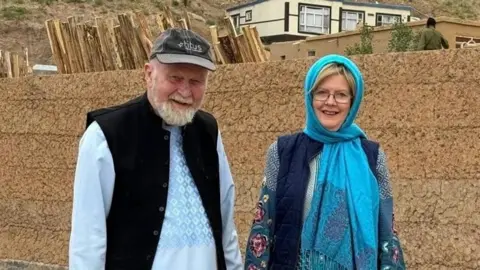The plight of a British couple, Peter and Barbie Reynolds, held by the Taliban for five months in Afghanistan has sparked significant concern and alarm, particularly regarding their deteriorating health. Their son, Jonathan Reynolds, recently shared his fears with the BBC, indicating that his parents’ lives could be at risk due to the harsh conditions they face in custody. The events surrounding their detention are troubling and reflect the broader humanitarian issues linked to the Taliban’s governance in Afghanistan.
Peter, aged 80, and Barbie, 76, were arrested on February 1 while they were reportedly attempting to return to their home in the central Bamiyan province of Afghanistan. Their son has expressed deep distress over the reported rapid decline in their health since their incarceration. Jonathan stated that his father’s condition has become precarious, with serious convulsions and signs suggestive of early Parkinson’s disease manifesting. Meanwhile, his mother’s condition is equally alarming, evident by symptoms of severe anaemia and malnutrition.
Despite their years of residency in Afghanistan, where they had established citizenship and were engaged in educational initiatives, the reasons behind their detention remain largely vague. A Taliban representative indicated back in February that the couple would be released “as soon as possible,” yet no further progress has been observed. The United Nations has echoed the urgency of their situation, warning that without immediate medical attention, the couple could perish in what they described as “degrading conditions.” The UN referred to their detention as “inhumane,” adding further pressure on the Taliban to act.
The anguish of waiting for his parents’ release has left Jonathan feeling “harrowed and surreal.” The couple had resided in Afghanistan for nearly two decades, where they contributed significantly through projects aimed at educating women and children. These initiatives were reportedly sanctioned by local authorities even as the Taliban imposed strict limitations on educational opportunities for girls over the age of 12 and barred women from employment.
While Jonathan Reynolds asserts that his parents have been deemed innocent by a judge, they continue to endure harsh treatment within a maximum-security facility, subject to conditions that many would find unimaginable. He described his father’s distressing experiences, such as being chained to dangerous criminals, spending extended periods in solitary confinement without exposure to sunlight, and generally being treated in a manner consistent with serious criminals rather than innocent civilians. The last communication Jonathan had with his parents was on June 15, revealing how precarious their health had become.
Mrs. Reynolds exhibits alarming physical symptoms that include discolored extremities, attributed to her dire nutritional status and lack of adequate healthcare. The Reynolds family remains in a distressing limbo, uncertain of their parents’ exact location or the validity of their current demands for release. Each week brings a repetitive cycle of delays, where authorities assure the family of imminent action, yet no movement materializes.
Moreover, Jonathan remains thankful for the Foreign Office’s levels of communication regarding his parents’ case, though he acknowledges the grim reality that they have had to celebrate significant life events—such as birthdays and their 55th wedding anniversary—within the confines of a prison cell. They were married in Kabul in 1970, and yet, they find themselves in a vastly different Afghanistan, marked by fear and uncertainty.
In a statement from the United Nations, officials emphasized that the couple’s ongoing detention lacks justification and called for their immediate transfer to a civilian healthcare facility to prevent further deterioration. The Taliban’s representative, Abdul Mateen Qani, had promised in February to review their situation, but as time drags on with no resolution, concerns escalate regarding the well-being of these elderly citizens who have devoted their lives to a country in need.
As the situation develops, attention continues to focus on the Reynolds family’s desperate plea for assistance. Their story encapsulates the harrowing reality many face within Afghanistan, particularly regarding human rights under the Taliban regime. The UK’s Foreign, Commonwealth & Development Office (FCDO) reiterated its limited capacity to assist due to the closure of its embassy, further complicating the efforts for the couple’s release and care. Amidst this troubling narrative, the call for humanity and urgency resonates loud and clear, urging immediate action for the couple trapped in dire circumstances.












